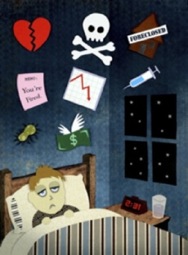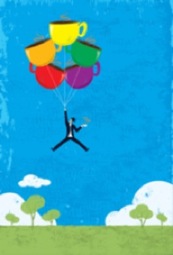Getting to know their personal triggers helps people with bipolar disorder to prevent relapse and stop symptoms from getting worse. Common triggers the person may experience include:
- Stressful negative or positive life events (e.g. the birth of a baby, a promotion, losing a job, ending a relationship or moving house).1
- Disruption to sleep patterns (e.g. due to jet lag or social events). Decreases in the time the person sleeps can contribute to hypomanic or manic symptoms, and increases in sleep or bedrest may be followed by depressive symptoms.2
- Disruption to routine. A regular structure (e.g. regular going to bed and waking up times, regular activities and social contact) can help to maintain the bodies sleep patterns and usual energy levels. 3
- Too much stimulation from external sources (e.g. clutter, traffic, noise, light, crowds, work deadlines or social activities)
- Too much stimulation from within the person (e.g. overstimulation from lots of activity and excitement when the person tries to achieve challenging goals or having stimulating substances like caffeine (e.g. in coffee or cola) or nicotine (e.g. in cigarettes or nicotine patches).
- Abusing alcohol or street drugs can cause the person to have ongoing bipolar symptoms, more frequent relapses and hospitalizations.4
- Conflict and stressful interactions with people
- Illness that is not treated or managed.
For suggestions about how to help the person with their triggers see:
References
- Johnson SL, Cuellar A, Ruggero C et al. Life events as predictors of mania and depression in bipolar I disorder. J Abnorm Psychol 2008; 117: 268-277.
- Plante DT, Winkelman JW Sleep disturbance in bipolar disorder: Therapeutic implications. Am J Psychiatry 2008;165: 830-843
- Frank E, Gonzalez JM, and Fagioloni A. The importance of routine for preventing recurrence in bipolar disorder. Am J of Psychiatry 2006; 163(6): 981-985
- Strakowski SM, DelBello MP, Fleck DE, Arndt S. The impact of substance abuse on the course of bipolar disorder. Biol Psychiatry 2000; 48: 477–485.


